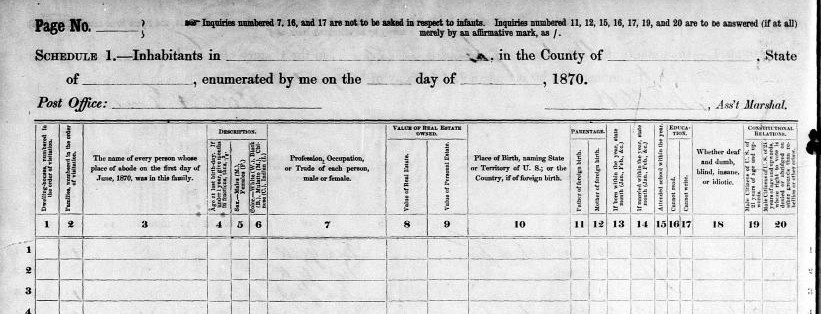
Standout Census Stories: An Archives Executive Discovers His “Huckster” Grandfather
By Editorial Staff | National Archives News
WASHINGTON, January 20, 2022 — Editor’s note: The National Archives is scheduled to release the records of the 1950 Census on April 1. In anticipation, National Archives News will publish a series of stories in the coming months about what can be gleaned from census records, and how personal histories can encapsulate entire eras. Our first Standout Census Story comes from Chris Naylor, Acting Research Services Executive.
Read more about enhanced digital access and public collaboration opportunities for the census on National Archives News. Explore in-depth topics about the 1950 Census on History Hub before the upcoming records release.
Fruits, Vegetables, and Archives
Anyone with even a passing interest in family history is well acquainted with the central role of census records as a launching point for genealogical research. The upcoming April 2022 release of the 1950 Census reminded me of how this journey began for me in December 2003 as a newly hired archives technician in the Microfilm Reading Room at the National Archives Building. While assisting the steady flow of visitors with their genealogical research, I witnessed daily the anticipation and thrill in their faces when discovering a previously unknown piece of information about their family in our records.
The inclusion of occupation beginning in the 1850 Census added an additional level of interest for me personally. Some of the professions listed in the census often brought me a chuckle or left me scratching my head. A few that caught my eye when I came across them include alligator wrestler, snake charmer, and shovel bone breaker.
Sometimes the census takers even added their own thoughts regarding the occupation. In one instance in the 1910 Census, the profession is listed as clairvoyant, with the industry described as “fakeing?”
Knowing that some of my ancestors lived in the Washington, DC, area during the 1800s, I began searching through the census records to locate them. When I found my great-great-great-grandfather William F. Crowley in the 1870 census, his profession was “huckster,” and his place of residence was Ward 7 in Washington, DC.
My first question was, what in the world is a huckster? Which I subsequently learned is a person who sells small items, such as fruits and vegetables. I was keen to know more, so I turned to the 1869 Boyd’s Directory for Washington and Georgetown, which also listed his profession as huckster, but this time provided his place of business as “440 Centre Mkt.”
Next, I found William Crowley in the 1880 census, which listed his profession as Commission Merchant. I confirmed in the 1880 Boyd’s Directory for the District of Columbia that he worked in produce at 10 Center Market.
As a new employee at what we call Archives I, I had recently learned that the National Archives Building was built on the same location where the Center Market once stood. While sitting in the Microfilm Reading Room, I realized that my great-great-great-grandfather and I worked at this same location in Washington, DC, over a century apart.
This discovery and many others throughout the years have begun with information gleaned from census records that led me to other records detailing various aspects of my family’s history.
The First "Archivist"?
Given my own profession, I then decided to see if I could determine the first person identified in the federal census as an archivist for the U.S. government. I began with a keyword search on ancestry.com (acknowledging my dependence on the accuracy of ancestry.com’s transcriptions), which includes the occupation field in the census forms. My search returned more than 25 individuals in the 1940 census, primarily archivists, assistant archivists, associate archivists, and junior archivists at the National Archives. But would I find anyone in Washington, DC, identified in the census as an archivist prior to the establishment of the National Archives in 1934?
Beginning with the 1930 census, I located two individuals in Washington, DC, associated with the archival profession, and both turned out to be employed at the Library of Congress. The first, Curtis Garrison, has an occupation listed in the 1930 census as “Archivist, Library.” This name may be familiar to some readers: in 1927, Garrison began his archival career in the Manuscripts Division at the Library of Congress while finishing his PhD in history and economics at Johns Hopkins University. In 1933, Dr. Garrison became the State Archivist for Pennsylvania and went on to have a successful career, including a return to federal service in 1946. He was a founding member of the Society of American Archivists (SAA) and subsequently worked as associate professor of archives and manuscripts at C.W. Post College from 1972 to 1976.
The second person, Robert W. Gordon, is listed in the 1930 census as Director Archives, U.S. Government. It turns out that Robert Winslow Gordon was the founding director of the Archive of American Folk Song (now the Archive of Folk Culture) at the Library of Congress.
I ultimately located one more individual, Howard Hamblin, this time in the 1920 census listed as an Archivist, U.S. Government. Curious as to where Mr. Hamblin worked, I turned to the Official Register of the United States for 1921 and learned that he was a clerk at the Department of Interior Office of Indian Affairs.
It intrigued me that Howard Hamblin identified himself to the census taker as an archivist instead of his official title of clerk. This once again reinforced for me that the information on each census page is as it was provided to or interpreted by the census taker.
While awaiting the release of the 1950 Census, I wonder what new details we may learn about the American experience and our own families. I also found myself asking—will there be any snake charmers or alligator wrestlers?
